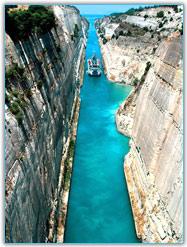The Canal of Corinth has been the bridge that connects the greek mainland with Peloponnese, a peninsula that is bigger in the south part of the mainland (until Thessaly), since ancestry. This is a natural bridge that attracted the creation of atown centre that would bring about both advantages and disadvantages.

Corinth Canal
From one hand, a town located by the canal would benefit from taking control of this path. This town would have the opportunity to found an economy based on the maritime activities that were carried out within the two seas, separated by the canal and at the same time, it would develop commercial relations with town centers from eastern and western countries.
The role of Corinth as an important passage turned to a disadvantage when population groups from the north moved to the south for a permanent residence. Invaders who passed through Corinth every now and then caused several troubles in that area preventing it from progressing in the fields of politics and economy. According to Homere, Corinth was a small regional centre, politically dependant on Agamemnon’s kingdom. Moreover, Corinth managed to benefit from its position on the crossroad between north and south and from its maritime activities, only during one specific period of its long ancient history, which is also known as the Golden Age of Corinth. This age started almost two centuries after Dorians’ arrival and ended during the Persian Wars. The conflicts with maritime powers who claimed the same interests as Corinth, lead to its end.
Asklipeion and Gymnasium
Excavations have brought to light the Asklepieion of Corinth which was located to the north of the Theatre and 400 meters away from it. A temple had been built in the middle of the yard which was connected with a square yard with a peristyle in it and arcades along its four sides.
Read more…
Acrocorinth
A rocky, steep, 575 meters tall hill used to be the acropolis of Corinth during the ancestry and the Middle Age. Its name is Acrocorinth and it could be accessed only through a tortuous road.
Read more…
Sikion Corinth
A fertile valley, at the area where nowadays Kiato city is located, was the
The treasure of Sikion in Delphi
Sikion field during ancestry and it was a part of the ancient Sikion state. The most important evidence of the prosperity of Si.
Read more…
Flious
Ancients Flious prefecture extended in “Fliassion field” which was famous during ancestry thanks to the wine produced there. Nowadays, it is known as the valley of Nemea which is also very famous thanks to its wine.
Read more…
Corinth
Corinth was completely destroyed in 146 BC by the Romans, as a result of a decision taken by the assembly of the Achaic League concerning war declaration against Spartans and Romans. After a series of mistakes made by the Corinthian leaders, the Romans conquered Corinth and slaughtered all men, enslaved the women and the children and set free all the slaves.
Read more…
Corinthia district
Ancient Corinth borders with Megara
Ancient Corinth - Ancient Megara borders
The frontiers between Corinth and Megarida were the hills at the area of Geraneia. A mountainous road connected the area of present Loutraki with Megara town through.
Read more…
The history of ancient Corinth
A brief introduction to the history of Ancient Corinth, which have been divided into four eras:
.
Read more…

